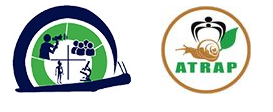ATRAP
Action Towards Reducing Aquatic snail-borne Parasitic diseases
About ATRAP
ATRAP is a collaborative initiative between institutions in Uganda, the Democratic Republic of Congo (DRC) and Belgium, working together to reduce the burden of vector-borne diseases such as schistosomiasis and malaria. Guided by a transdisciplinary approach, ATRAP brings together experts in medicine, ecology, anthropology, epidemiology, communication and the affected communities.
Our approach
Our work is built on the citizen science approach. This means that we actively involve local communities in Uganda and DRC in the research and response to vector-borne diseases, specifically schistosomiasis and malaria. Rather than relying solely on experts, we invite community members to help observe, collect data, share knowledge, and co-design solutions.
Where we work
ATRAP is implemented in areas with a high burden of vector-borne diseases, where existing control efforts face significant challenges, including socio-economic barriers.
Our partners
Our work is made possible through strong partnerships with a diverse range of institutions, including academic institutions, local health authorities, community-based organisations, and (international) research centres, to co-develop effective, context-specific responses to vector-borne diseases.

